Garbage were one of the most exciting acts to emerge from the 1990s. Tony Barrell met Shirley Manson and her bandmates as they released their second album, Version 2.0
THE SUNDAY TIMES, 1998
Madison, Wisconsin, USA: it is an overcast day in 1994, and pop history is being made. Three American producers are trying out a singer for a new band – their new band. Butch Vig, Duke Erikson and Steve Marker are in the basement of Steve’s house, fiddling with some “very lo-fi” recording equipment. Shirley Manson is upstairs in the living room, singing into a microphone, with headphones clamped over her red hair and only Steve’s cats for company.
Things don’t seem to be going very well at all. The guys keep playing a few weird, incomplete rock tracks and giving decidedly unhelpful suggestions through the headphones, like “Make something up.” She feels “cheap and disgusting”. They don’t seem to know what they’re doing. Can this really be the same Butch Vig who worked with Nirvana to produce Nevermind, the most successful grunge album of all time? Can this really be three of the hottest remixers in the world, renowned for their work with U2, Depeche Mode and Nine Inch Nails? She ought to storm out of here and go home – except Edinburgh is an awfully long way away.
The singing stops, but the three boffins carry on messing with the tapes. Suddenly, Duke realises that Shirley has been up there for a while. He goes upstairs to find that she is no longer by the mike but sitting on the floor, stroking Steve’s cats. Is she okay? She’s fine, she says, but it doesn’t sound convincing. They retire to a local bar to get roaring drunk – drown their sorrows.
The Garbage story could easily have ended there. One of the most distinctive bands of the 1990s would simply not have happened. There would have been no debut album to go double platinum in five countries, selling 4m copies; no dark but catchy hit singles (‘Vow’, ‘Only Happy When It Rains’, ‘Queer’, ‘Stupid Girl’, ‘Milk’, ‘Push It’); no 1996 MTV award for “best breakthrough artists”. Fortunately, Butch, Duke, Steve and Shirley all agreed that there was a chemistry there that was worth pursuing; that they should give it another shot. This time she passed the audition.
Shirley’s voice is a rich, haunting thing that can snarl and seduce in the same breath
Nearly four years later, it is hard to imagine anyone else fronting Garbage. Few voices could complement the band’s highly charged pop noise as well as hers – a rich, haunting thing that can snarl and seduce in the same breath. Take their 1995 single ‘Queer’: when she sidles in with “Hey boy, take a look at me, Let me dirty up your mind,” she sounds as if she really means business.
As a band, Garbage offer a re-entry point for lapsed pop fans, by bridging the gap between the classic, melodic stuff of the 1970s and 80s and the dense guitars and programmed beats of today. It is an alchemy that has driven many music critics into a tizzy. According to one review, they are “Possibly the world’s first gothic-grunge-disco band”. Other commentators have invoked an improbable Who’s Who of comparisons: they are like the Pretenders, Blondie, the Jesus and Mary Chain, Split Enz, “an evil Duran Duran”, “the Cranberries with the amps turned on” – even Nirvana with Kylie Minogue on lead vocals.
Among their younger supporters, they inspire full-out fanaticism: girls have been seen at Garbage gigs dressed as Shirleyettes, in miniskirts, high boots and heavy make-up; and boys were agog when pictures of Shirley accidentally exposing a breast appeared on the internet.
In person, Shirley is every bit the forthright, no-nonsense character the records suggest. This is a woman who has expressed a wish for the Spice Girls to be “tarred and feathered”. This is “a sex kitten with claws” (Daily Star), whose whole aura tells you she is not to be messed with. But obviously the Kensington hoteliers who are supposed to be catering to her today don’t know this. Sitting in the lobby with the rest of the band, the 31-year-old singer scans the five-star wood panelling with critical, greenish eyes.
Garbage are in London to talk about their second album, Version 2.0, and an upcoming tour, and Shirley is indignant. “Something went missing from my room,” she says, “and the management doesn’t seem to give a damn.” What was it? “A bottle of champagne. And when I complained they said, ‘Well, you can have another bottle of champagne.’ I said, ‘You’ve obviously missed the point.’ If there’s one thing you want in a hotel, it’s a vague sense of security.”
Her Madisonian companions – Steve, 39 (guitar and bass), Butch, 42 (drums and noise), Duke, 47 (guitar, keyboards and bass) – have also “had their minds blown” by this place, she says. Particularly Duke. The band elder was rebuked in this very lobby for doing something way too rock’n’roll: eating a banana. “Sir, would you mind not eating that banana here?” one of the hotel staff demanded. “Could I wrap it for you and take it to your room?” Apparently there was a risk that he would bump into another guest and soil their clothing. “I was so intimidated,” says Duke. “I put it in my pocket.”
What on earth would the hotel Gestapo say if Shirley started practising her gastronomic perversion here? She eats burnt matchsticks, doesn’t she? “I did,” she replies, “but I’ve stopped that. That is one vice I’ve cut out.”
“That’s f***ed up,” quips Butch.
“Occasionally I crave it,” says Shirley, “but I don’t do it. I don’t know where it comes from, but I love – I love – the taste of it.” Did she worry that she might be pregnant? “Darling,” she trills in her schoolmarmiest Edinburgh, “I was taught the facts of life and I know you can’t get pregnant from burnt matchsticks. Where’ve you been, love? Where’ve you been?” The band laugh helplessly.
For the past few minutes, I point out, she has been sucking on a matchstick, turning it crimson with her lipstick. “Oh! I do apologise. Don’t look.” She tucks the stick under an ashtray, but later she will retrieve it and start sucking again.
The combination of three tall, laid-back Americans and a wild, waifish Scot initially seems a bizarre marketing proposition. But the personalities in Garbage are just as distinctive and just as caricaturable as Shirley’s beloved Spice Girls. Butch is the neatly hirsute Norwegian-American, fond of using adjectives like “lo-fi” and “super-vibey”; Duke is the cool dude with the goatee and the Mr Spockish demeanour; Steve is the band’s shaven-headed gentle giant, who has been known to tear telephone books in two; and then of course there’s Shirley, the flame-haired bossyboots with the weird appetite for carbon.
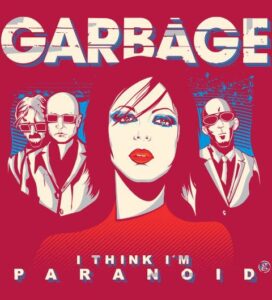
But her life has deeper darknesses. As a child she thought she was “the ugliest creature alive”, and she used to cut herself deliberately with razors. She was bullied at school, where the future rock siren was likened to a frog because of those striking, widely spaced eyes. Even now there seems to be a deep well of self-deprecation. “We’re supposed to be this really sexy band,” she says after the Sunday Times photo session, “but we look so terrible in a lot of our photographs. I just think people look at our photos and take pity on us.”
She worked for five years in a Miss Selfridge shop, where she specialised in make-up and being rude to customers
She grew up in Stockbridge, Edinburgh – an area whose bohemian reputation was confirmed when she discovered her best friend’s mother was a prostitute. Life was comfortable enough, but she admits to having been a “vile” and “sullen” young thing, “angry for no reason at all”, who would spend an unhealthy amount of time shut in her room listening to the same Siouxsie and the Banshees record over and over again very loudly, while “my wee sister would sit outside my bedroom door, crying, because she thought I’d gone completely off my head”.
After school she worked for five years in the local Miss Selfridge shop, where she specialised in make-up and being rude to customers. “It was a profoundly depressing experience,” she says, “and I was an absolute monster. To this day I get people saying, ‘I’ve met you before – behind the make-up counter at Miss Selfridge. You used to stare at me and I was really frightened of you.’” Salvation from the day job came when the band she was playing keyboards in, Goodbye Mr Mackenzie, were signed to Capitol Records at the end of the 1980s. When they split after minimal chart success, Shirley ended up as lead singer of a band called Angelfish.
MTV saw fit to screen an Angelfish video, for a song called ‘Suffocate Me’. They showed it only once, but Steve Marker was watching and a lightbulb went on over his head. “The singer had a great voice,” he remembers. “We were thinking about having a woman singer for this band we were imagining. We’d heard a lot of voices, but everything was all girly-sounding and screechy, and she had this dark, smoky sound that just seemed to convey something.”
Now all they had to do was track her down and put her in front of a microphone. Which is where, you’ll remember, we came in.
Madison, capital of Wisconsin, is a flat and pretty city in the south of America’s Badger State. It sits between two huge lakes, boats a gleaming miniature of Washington’s Capitol building, and is so leafy that its well-regarded university has an arboretum all to itself. The only harsh thing about the city seems to be the Wisconsin winter, which brings heaps of snow and temperatures way below zero. Even then, it looks beautiful.
This prim and proper city could actually lay claim to as much bohemianism as Shirley’s Stockbridge. It’s a very studenty place, known for its artiness and its liberalism. In the 1960s it was the site for some fierce demonstrations by anti-war campaigners, which reached a peak in 1970 when activists blew up the university’s physics wing because it was helping the military to plot bomb trajectories.
It was at that same university that Butch, Steve and Duke met and started playing in bands in the early 1980s. Butch and Steve subsequently set up their own recording facility, Smart Studios, and the three musos steadily built up a reputation as producers and remixers to the stars, before they started itching to form their own band again. Garbage have recorded both their records at Smart, an anonymous red-brick building on the corner of an ordinary street.
I try hard not to allow Americanisms into my life, because when I go back to Edinburgh I’d be treated like a leper
Shirley spends most of the year in Madison, but is careful no to lay her roots too deep: while the men have houses here, she stays in a hotel. And she watches her language. “I try hard not to allow Americanisms into my life, because when I go back to Edinburgh I’d be treated like a leper. It’s difficult. I occasionally find myself saying ‘awesome’, which makes me cringe with embarrassment. And, much to the annoyance of a lot of my friends, I tend to get into the wrong side of the car.”
When she gets home, which she does “three or four times a year”, she has a husband waiting for her. His name is Eddie, he is an artist, and they married in 1996. He must be a very understanding person, I say. “I don’t think it’s necessary to talk about my husband,” she replies. “He doesn’t want his life paraded in newspapers and I have to respect that.” She falls stubbornly silent. “But he is fabulous,” she finally laughs.
She is intensely proud of her Scottishness – so proud that, when the band played their first Scottish gig, in Glasgow in 1996, she persuaded her colleagues to put on kilts for the encore, and attached a sporran to her miniskirt. “I didn’t want to walk in like some international jet-set superstar with my American band and not acknowledge the fact that I came from Scotland,” she says. But it backfired. “The crowd went absolutely nuts – I think they really appreciated it. But the Scottish insinuated that the kilts were put on out of a lack of respect for the Scots – that we were being condescending.”
Are the people of Madison used to having this Scots firebrand around? “I don’t think they can wait till I disappear off their horizon,” she says. “I think they’re sick of me pissing and moaning about their lovely town. And I can understand it. I’m a pain in the arse.”
“She had a quote in a magazine,” says Butch, “saying Madison was like the movie Fargo but without the funny bits.”
“I was just being cheap,” says Shirley. “When you do interview after interview, you have to have fun. And, of course, people took great umbrage.”
Recently, Madisonians had another cause for complaint. Suddenly, without any warning, the almightiest racket started up in a small residential area, in an abandoned building that had once housed the Madison Candy Company. Some people must have wondered whether the anti-war bombers had returned. They called the police. Inside the building were Garbage, who were so impressed by the cavernous acoustic of the place that they were recording some rhythm tracks there for the new album. “It was so f***ing noisy,” says Butch. “Within about two minutes the cops showed up. One of them recognised us and basically said, ‘Go ahead, but wrap it up in half an hour or so.’ But we used a lot of stuff from there for the album.”
We’re not happy sticking a microphone in front of something and having it sound pristine and clean like you’re supposed to. We want things to sound a little weird
The story is typical of a band constantly on the lookout for bigger and better special effects. Barking dogs, telephones, air-conditioning units and the ripping of sheet metal have all been grist to the Garbage mill, giving their songs an edge of darkness that complements lyrics about schizophrenia, alienation, domination, obsession and revenge. It is as if the noise is a kind of medicine that helps the pop sugar go down.
The search for the perfect ambient cacophony often takes them to the basement of their studio, a sprawling treasure house of old effects pedals and other arcane bits and pieces. “We’re not happy sticking a microphone in front of something and having it sound pristine and clean like you’re supposed to,” says Steve. “We’re kinda restless and we want things to sound f***ed up, a little weird.”
As well as found sounds, Version 2.0 contains some vocal borrowings from pop history, notably the refrain from ‘Don’t Worry Baby’ by The Beach Boys, and a magic moment an the end of the song ‘Special’, when Shirley bursts into a snatch of ‘Talk of the Town’ by the Pretenders. “I was ad-libbing,” says Shirley, “and I did this little rhythmic thing with my voice and I thought, ‘Oh! That sounds like Chrissie Hynde.’ And that obviously triggered ‘Talk of the Town’, which happened to fit melodically into the outro.”
Butch was such a big fan of Roxy Music when he was at college, he formed a fan club and held weekend Roxythons
Hynde is one of Shirley’s musical heroines, and when Garbage first played Top of the Pops in 1995 they got to meet her. “I was shaking and I kept on saying to myself, ‘Be cool, try and act normal,’” says Shirley. “She walked over and for some reason I just lunged at her and I went, ‘I love you!’ And she sort of flinched a little. I completely blew my moment: I would love to have been cool but I was an absolutely fawning idiot.”
If Bryan Ferry walked through the door right now, the normally restrained Butch might behave the same way. He was such a big fan of Roxy Music when he was at college, he formed a fan club and held weekend “Roxythons”, during which he and his pals would play nothing but the British band’s music and “drink beer and smoke pot and basically get crazy. Roxy Music seemed so cool; they seemed like they were from outer space”. He remembers trying to figure out the lyrics for ‘Virginia Plain’, and mishearing the line “Teenage rebel of the week” as “Turn me like a rotary”. That could almost be a Garbage lyric, in an as-yet-unwritten song about, say, people being spit-roasted by cannibals.
But Garbage’s influences go beyond music. Their modus operandi – the way great pop records are born out of an obsessive layering of loops of noise form the everyday world – has antecedents such as the artist Kurt Schwitters, who ferreted around in garbage for odds and sods of paper and card that went into his collages. There is also the cult American sci-fi writer Philip K Dick, author of the book that became the film Blade Runner, who once wrote: “I do seem attracted to trash, as if the clue – the clue – lies there… What I write doesn’t make a whole lot of sense. There is fun & religion & psychotic horror strewn about… I also see how this fast shuffling of possibility after possibility might eventually, given enough time, juxtapose & disclose something important & automatically overlooked in more ordinary thinking…”
“Cool,” says Butch. “That’s a great quote. And the analogy with Philip K Dick is apropos, because we watch a lot of films in the studio, and Blade Runner is one of our favourites.”
“It’s a great movie,” says Shirley, whose need for such diversions in the studio, while her boffin friends tinker endlessly, has sometimes driven her to violence.
“While we were recording the first album she went mental,” says Butch, “because we’d record something and then one of us would tweak it for, like, six hours, and it’s incredibly boring if you’re not the one doing it. So we got lots of ‘dead arms’ from Shirley out of frustration. Just really weird, super-quick punches, right in the bicep.”
And she doesn’t do that any more? “We got a computer,” says Butch.
“So now she can email her friends,” explains Steve. “She can email her frustrations.”
“I did use to hit you – that’s right,” says Shirley. “I just realised – that’s what’s missing!” If Garbage’s next album sounds even tenser than their first two, a little more tortured, you’ll know why. ♦
© 2014 Tony Barrell
Tony Barrell’s acclaimed book Beatlemania is officially sold out, but copies can be found.
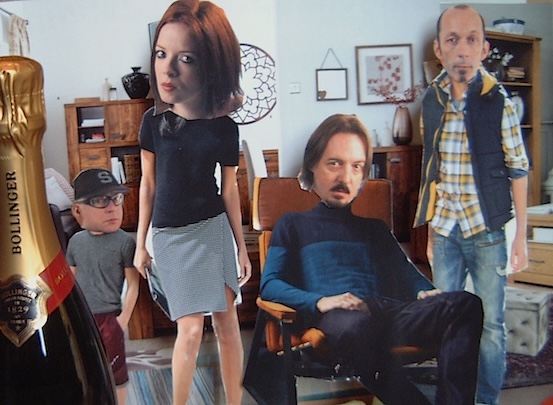
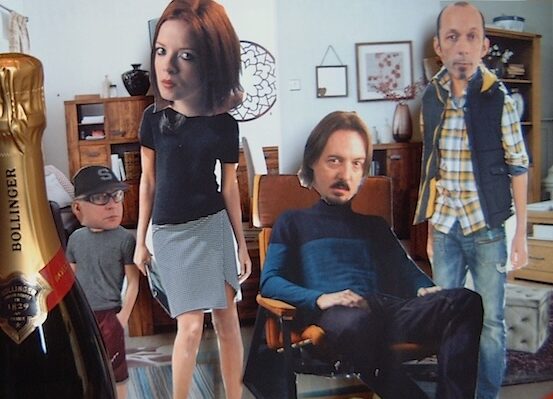
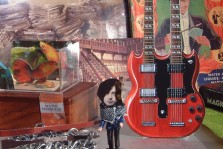
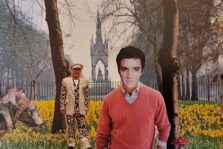
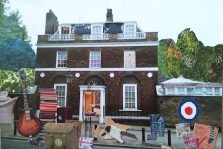
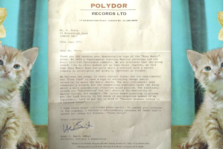
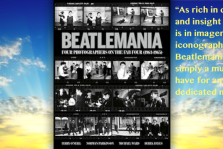

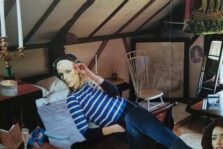

As a huge Garbage fan, I’m thrilled to find this article. I’ve never read it before and it’s great. Thanks. I’ll be sharing this and exploring more of your site!